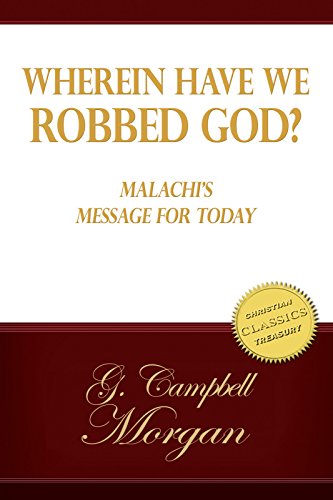Wherein Have We Robbed God? Malachi's Message To The Men Of Today
G. Campbell Morgan
BOOK REVIEW

In the heart of theological discourse lies an inquiry that transcends time and culture-a question posed with audacity and urgency: "Wherein Have We Robbed God?" This profound exploration by G. Campbell Morgan is more than a mere theological treatise; it's a clarion call, reverberating through the corridors of contemporary faith and morality. The text is not just an exposition of the Book of Malachi; it is an incisive examination of the tensions between divine expectation and human behavior, and it dares us to confront our own moral bankruptcy.
Morgan's legacy as a preacher and writer is magnified in this tightly woven argument. Born in the crucible of the late 19th century, he was a man who stood firmly at the intersection of faith and intellect, crafting messages that resonate even today. His study of Malachi reflects not only historical insights but also a prophetic voice, urging today's men to reckon with their spiritual thefts. What does it mean to rob God? In the modern landscape, where materialism often overshadows spirituality, this question is not merely rhetorical-it is a challenge that strikes at the core of our existence.
As you delve into the pages of Wherein Have We Robbed God?, you are invited into an introspective journey that invokes everything from self-reflection to societal critique. Morgan boldly illustrates the failures of the people of Malachi's day, drawing parallels that feel hauntingly relevant. Are we, like them, guilty of neglecting our responsibilities to God and to one another? In a world where distractions are a dime a dozen, it's all too easy to let our spiritual duties slip through the cracks.
Readers have expressed mixed emotions about Morgan's work. Some praise his ability to blend scriptural authority with practical application, asserting that he deftly guides believers toward a renewed commitment to their faith. Others, however, grapple with the severity of his messages, arguing that the weight of his philosophical inquiries can feel overwhelming. Nevertheless, what remains undeniable is the power of his prose-each sentence is steeped in conviction, compelling us to wake up and engage with our spiritual lives more authentically.
But let's not become too comfortable with our critiques. Morgan's intention is not to berate but to galvanize. The urgency of his message is palpable, threatening to shake us from apathy. It's a proposition: what if the financial, emotional, and spiritual investments we make in our lives are felt as thefts against God if they do not come from a place of sincerity and love? The thought is arresting. It challenges you to review not only your tithes but also your time and talents, pressing you to act with intention.
Morgan's penchant for soaring rhetoric evokes a spectrum of emotions-from guilt to resolve. As the narrative unfolds, it culminates in a cathartic realization that seeking God is not merely about compliance with rituals but about a heartfelt relationship. It is a reminder that God desires our honesty, our vulnerability-even our failures. The gravity of this realization compels one to wonder: might we collectively be robbing our own souls of the connection they yearn for?
Critics of this work may assert that its tone can be harsh, potentially alienating those who seek comfort in their faith. Yet, perhaps therein lies its strength. It's daring to shine a light on uncomfortable truths that many would rather ignore. Morgan embodies the role of a spiritual provocateur-his words act like a mirror, reflecting our shortcomings while guiding us toward redemption and understanding.
What is the takeaway from this stirring text? It's a call to arms for the modern believer. The author beckons you to confront your spiritual apathy, urging you to reclaim the integrity that comes from committing fully to the divine. The stakes are high-your relationship with God, your community, and ultimately your very self depend on it. The world is watching; are you ready to answer the call?
In a time marked by secularism and disillusionment, Wherein Have We Robbed God? is not just a reframing of a biblical inquiry; it is a passionate plea to revitalize faith. Whether you consider yourself a believer or a seeker, Morgan's words will stir something within you. This is not merely an intellectual exercise; it's a transformative journey that demands your engagement. In the end, the question remains: how will you respond? Will you rise to the occasion, or will you let this opportunity slip away? The choice, dear reader, is yours. 🌟
📖 Wherein Have We Robbed God? Malachi's Message To The Men Of Today
✍ by G. Campbell Morgan
🧾 67 pages
2015
#wherein #have #robbed #god #malachis #message #today #campbell #morgan #GCampbellMorgan